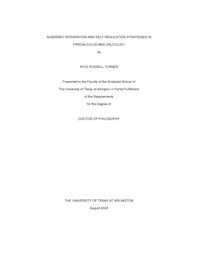
ATTENTION: The works hosted here are being migrated to a new repository that will consolidate resources, improve discoverability, and better show UTA's research impact on the global community. We will update authors as the migration progresses. Please see MavMatrix for more information.
Show simple item record
| dc.contributor.advisor | Álvarez, James A. M. | |
| dc.creator | Turner, Kyle Russell | |
| dc.date.accessioned | 2023-06-28T15:17:34Z | |
| dc.date.available | 2023-06-28T15:17:34Z | |
| dc.date.created | 2022-08 | |
| dc.date.issued | 2022-08-15 | |
| dc.date.submitted | August 2022 | |
| dc.identifier.uri | http://hdl.handle.net/10106/31377 | |
| dc.description.abstract | This case study examines the self-regulation strategies and academic integration of first-semester undergraduate students enrolled in precalculus and first-semester calculus at a large urban university in the southwestern United States. I use a sequence of interviews to examine the relationship of mathematics self-efficacy and mathematics identity on students’ use of these strategies. Five interviews occurred during the Fall 2021 semester with three precalculus and six calculus students, and I distributed initial surveys to thirteen first-semester calculus sections and five precalculus sections. To analyze the data, I integrated frameworks from Zimmerman and Pons (1986) and Wolters (1998) on the self-regulation strategies used in academic settings. I used quantitative and qualitative analysis to examine the data. This included analyzing the correlation between the use of self-regulation strategies versus both self-efficacy and mathematics identity. I also used content analysis to code instances of self-regulation strategy usage in the student interviews and how students adapt their strategy usage during the transition from high school mathematics courses to college mathematics courses. Through the analysis of these interviews and surveys, I present a multiple case study highlighting the transitional difficulties that the interviewed students faced, how they overcame these difficulties using self-regulation strategies, and how these results align with the larger context of the self-regulation strategies used by students as reported on the surveys. Findings suggest a positive correlation between students’ self-regulation strategy usage versus their mathematics identity and self-efficacy. Furthermore, based on data analysis, three broad self-regulation strategies were frequently used by academically successful students during their transition to college-level mathematics courses: metacognitive self-regulation, time and study environment, and effort regulation. The use of these self-regulation strategies and others were present in academically successful students. Additional research is then needed on how to best foster the use of these beneficial self-regulation strategies throughout their academic careers. | |
| dc.format.mimetype | application/pdf | |
| dc.language.iso | en_US | |
| dc.subject | Calculus | |
| dc.subject | Precalculus | |
| dc.subject | Mathematics Education | |
| dc.subject | Self-regulation | |
| dc.subject | Identity | |
| dc.subject | Self-efficacy | |
| dc.title | ACADEMIC INTEGRATION AND SELF-REGULATION STRATEGIES IN PRECALCULUS AND CALCULUS I | |
| dc.type | Thesis | |
| dc.date.updated | 2023-06-28T15:17:34Z | |
| thesis.degree.department | Mathematics | |
| thesis.degree.grantor | The University of Texas at Arlington | |
| thesis.degree.level | Doctoral | |
| thesis.degree.name | Doctor of Philosophy in Mathematics | |
| dc.type.material | text | |
| dc.creator.orcid | 0000-0002-0383-4997 | |
Files in this item
- Name:
- TURNER-DISSERTATION-2022.pdf
- Size:
- 7.312Mb
- Format:
- PDF
This item appears in the following Collection(s)
Show simple item record


